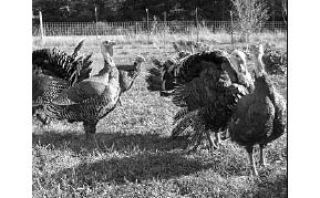Chris Warth and Sally Collins’ flock of turkeys, destined for the Thanksgiving table.
It’s November already and cover photos on cooking magazines feature the centerpiece of most Thanksgiving dinners: a turkey, perfectly roasted, surrounded perhaps by glazed carrots, creamed onions, mashed potatoes. It’s easy to imagine raising the vegetables that surround the bird, but the bird itself?
I talked recently with Lopezians Chris Warth and Sally Collins who raised five Broad Breasted Bronze turkeys this year. They made raising turkeys sound easy, though slaughter day did sound, as they put it, “kind of traumatic.”
Chris had raised chickens before but turkeys, he said, “grow a lot faster. It is just so amazing to watch.” They started with 2-day-old baby turkeys, called poults, from Valley Farm Supply in Mount Vernon, keeping them in their living room in a small water trough with a cover, a light and a thermometer, “just like they have at the farm store.” In six weeks, the turkeys were big enough to be outside.
“I built this fancy turkey tractor to drag around but they weren’t interested in it at all. They just wanted to sleep on top of it at night. In my experience they just wanted to climb on top on things and when they didn’t have a roost, they’d just find a little place on the ground.”
Despite the turkeys’ apparent preference for exposure, predators weren’t a problem. Chris credits his dog Rosie for keeping raccoons and eagles away.
For feed, Chris explained that young turkeys “need a higher protein diet than chickens because they grow so quickly. They need to develop strong leg bones to hold up their fast-growing bodies.” He bought starter feed from the feed store and then organic turkey feed here on Lopez, sharing an order with others who were raising a few turkeys.
“We had the normal three-gallon turkey feeder outside, but turkeys love to throw their food around. They would bail out all the food from the feeder and leave it on the ground. When I finally put the feeder in a larger, shallow tray, I recovered fully two-thirds of their food.”
Ranging freely in Chris and Sally’s fenced orchard, the turkeys also ate bugs and grass. And they loved tomatoes, reaching for them through the garden fence.
The most surprising thing about the turkeys,” Chris continued, “was their personality. They were interested in me. They would run toward me and look up and they would follow me until they were distracted by something tasty.”
“They also bond to each other very strongly. They really want to be together. If one was on the wrong side of the fence, the others would just stand there trying to figure out how to get back together.” And if one escaped the fenced area and the others were able to join it, they would all wander away, though not far.
Despite the turkeys’ personable natures, the plan was to eat them. “Slaughter day was more traumatic for me than I expected,” Chris said. “We did one and I was ready to set the rest free, but Sally insisted we finish the job.” They both advise “looking for ways to make slaughter day less traumatic and more humane.”
They rented equipment from the Northwest Agricultural Business Center in Mount Vernon. “The scalder and plucker were absolutely worth it,” Chris and Sally said, but because the equipment was sized for chickens they could do only one turkey at a time. The chicken-sized killing cones were too small to hold an 18-25 pound turkey so they made their own from a piece of sheet metal. Chris also wishes they’d had a stunning knife, a knife with an electrical component that stuns the bird before cutting. Finally, as Thanksgiving approaches they are thankful for Ben Kercsmar who joined them to help and give moral support.
If you haven’t already raised the centerpiece of your Thanksgiving dinner, you can buy locally raised turkeys from Jones Family Farms 468-0533. Ben Kercsmar, Northfield Farm 468-4679, is sold out for this year but will raise more heritage turkeys next year.
And if you want to raise your own turkeys next year, watch for a WSU Friday Harbor Extension workshop on raising turkeys next spring.



